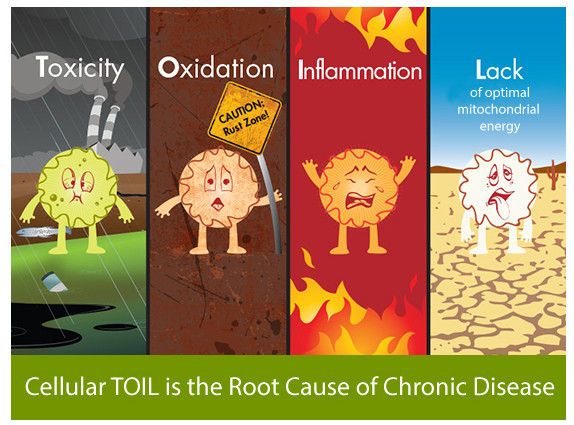I use a special term, Cellular TOIL, to help people understand the four core contributors to chronic disease: Toxicity, Oxidation, Inflammation, and Lack of optimal mitochondrial energy at the cellular level. Not such nice stuff, but it’s what I treat every day when seeing patients with chronic disease at my clinic in Utah.
Take another look at the illustrated image to the right depicting cellular TOIL. Those little cells in the picture above are not happy! You could say, with great scientific support, that such unhappiness is the root of all disease. Typical Western diets and increasing levels of environmental toxins lead to a condition of constant “Cellular TOIL,” which means cells suffer from:
Toxins
Toxins are an increasing part of modern life and are currently estimated by the Journal of Science, Journal of Environmental Perspective, and Journal of Nutrition as responsible for up to 90% of cancers, increasing obesity and diabetes rates, and health dysfunction all the way down to the genetic level. In addition to the 80,000 chemicals infiltrating the environment, the human body naturally produces toxins as part of the metabolic process of staying alive.
Every cell in the body excretes waste endogenously (from within). If cells can’t eliminate this waste properly on their own, it stays in the body and becomes toxic. Environmental toxins (hormones, pesticides, heavy metals, etc.), which deplete our supply of B complex vitamins, act like free radicals by scavenging cell membranes in our mitochondrial and systemic cell membranes. The more toxins absorbed and created metabolically, the harder cells must work to detoxify.
Oxidation
Free radicals are reactive electrons produced by normal metabolic oxidation processes. However, excessive free radical formation can wreak havoc by stealing electrons from and destabilizing healthy atoms and causing oxidative stress that damages all cell components. Oxidized lipids, sugars, enzymes, and proteins then stop functioning properly and become harmful waste products in their oxidized states in cells.
Inflammation
Damaged cell membranes become irritated and inflamed. This leads to a progressive shift in the type of cells that are present. This condition is characterized by a release of toxins and free radicals, which causes still more membrane inflammation. As a result, chronically inflamed cell membranes can’t communicate properly. Without adequate cellular communication, hormones, neurotransmitters, and enzymes can’t organize body functions properly. Vascular tissues then respond to harmful stimuli from damaged cells by becoming inflamed themselves, making inflammation a vicious cycle of escalation.
Lack of mitochondrial energy
Most health problems are due to a breakdown in cellular communication, diminishing the energy cells need to do their job. Without proper nutrition, cells become sickly and body systems deprived. With over six billion cells being constantly regenerated, abundant nutrition is required to support cellular needs and energy production.
When Synergy Turns Sour
All four components of TOIL build upon and amplify one another. For example, oxidative and inflammatory damage to the mitochondria in nerve tissues, neuropathy, is a key problem in diabetes. Oxidation of mitochondria is also quite prevalent in neurodegenerative diseases like Alzheimer’s and Parkinson’s diseases.
All diseases are part of the metabolic syndrome. Once we understand the importance of energy and information (E&I) and cell communication, we will expand its current narrow definition. TOIL can be addressed and largely corrected by protecting cellular membranes from damage and ensuring efficient intracellular communication.
Secret of the TOIL Model: The Restorative Quality of Love
However, there is a secret part of Dr. Rodier’s TOIL framework, which is the antidote to loneliness, loss, stress, unhappiness of every kind. It’s the restorative quality of Love.
Here are a couple of excerpts from my book Gut Health:
“In my experience, most chronic health problems are rooted in early life traumas in childhood, which may imprint the HPA axis, or the adrenal glands, into a state of chronic TOIL-ing, or inflammation, predisposing people to developing a ‘fragile mind.’”
“Psychosocial stress may also exacerbate the susceptibility to the adverse effects of toxins such as lead, polychlorinated biphenyls, and combustion emissions.”
I recommend Dr. Bruce Lipton’s work on The Biology of Belief if you are interested in learning more about the effect of emotions on your cells. In the meantime, here are a few simple things you can do to address TOIL due to lack of love:
- Don’t eat alone (go “Euro” and slow down enough to enjoy more meals and conversation with loved ones)!
- Do what you love (get “playful” with kids, puppies, gardening, fooling around, and anything else that makes you smile broadly or laugh out loud – write down one thing you love and commit to doing it today)
- Forgive and forget (go “kindergarten” and let bruised egos take a back seat to “let’s be friends again”)
- This last one is tough for a whole lot of us. Sometimes it is so tempting to want to be “right” versus be “loved.” Wouldn’t it be cool if we could do a little more forgetting, about mistakes and mishaps, our own and others’ too?
My Cellular Detox Diet
My tiered, 8-week cellular health and detoxification diet focuses on elimination of all refined foods and sugars with an emphasis on lean meats, eggs, fresh vegetables, and nuts. Yep, you read that right. No fruits (which are high in natural sugars). No legumes. And, particularly, no grains.
The first two weeks are very strict, and then Dr. Rodier allows inclusion of fresh fruits over the next two weeks, legumes over the third two weeks, and then testing of grains after that. For more information on the Cellular Detox Diet, pick up a copy of my newest book Switching Off Chronic Disease.



